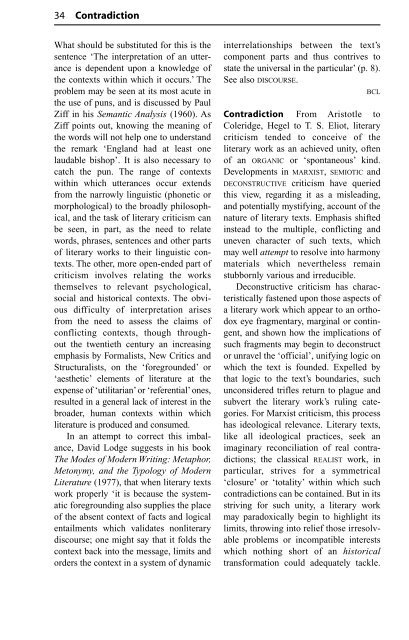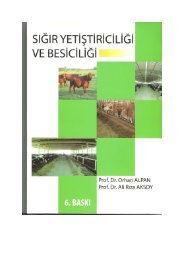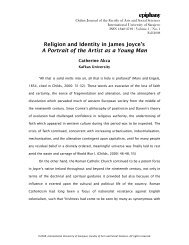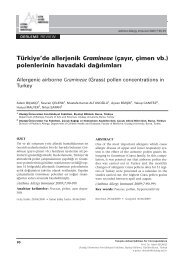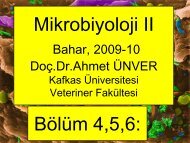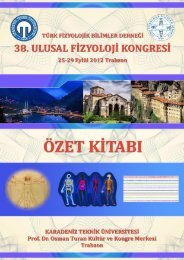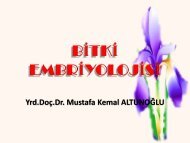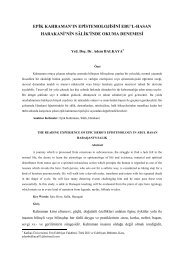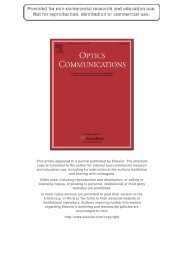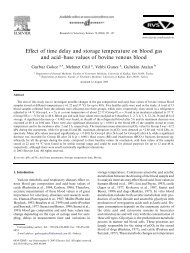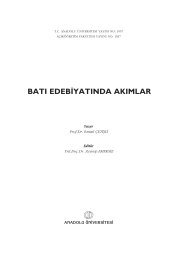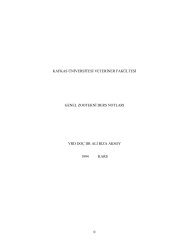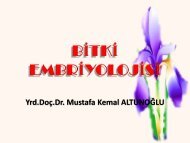The Routledge Dictionary of Literary Terms
The Routledge Dictionary of Literary Terms
The Routledge Dictionary of Literary Terms
Create successful ePaper yourself
Turn your PDF publications into a flip-book with our unique Google optimized e-Paper software.
34 Contradiction<br />
What should be substituted for this is the<br />
sentence ‘<strong>The</strong> interpretation <strong>of</strong> an utterance<br />
is dependent upon a knowledge <strong>of</strong><br />
the contexts within which it occurs.’ <strong>The</strong><br />
problem may be seen at its most acute in<br />
the use <strong>of</strong> puns, and is discussed by Paul<br />
Ziff in his Semantic Analysis (1960). As<br />
Ziff points out, knowing the meaning <strong>of</strong><br />
the words will not help one to understand<br />
the remark ‘England had at least one<br />
laudable bishop’. It is also necessary to<br />
catch the pun. <strong>The</strong> range <strong>of</strong> contexts<br />
within which utterances occur extends<br />
from the narrowly linguistic (phonetic or<br />
morphological) to the broadly philosophical,<br />
and the task <strong>of</strong> literary criticism can<br />
be seen, in part, as the need to relate<br />
words, phrases, sentences and other parts<br />
<strong>of</strong> literary works to their linguistic contexts.<br />
<strong>The</strong> other, more open-ended part <strong>of</strong><br />
criticism involves relating the works<br />
themselves to relevant psychological,<br />
social and historical contexts. <strong>The</strong> obvious<br />
difficulty <strong>of</strong> interpretation arises<br />
from the need to assess the claims <strong>of</strong><br />
conflicting contexts, though throughout<br />
the twentieth century an increasing<br />
emphasis by Formalists, New Critics and<br />
Structuralists, on the ‘foregrounded’ or<br />
‘aesthetic’ elements <strong>of</strong> literature at the<br />
expense <strong>of</strong> ‘utilitarian’or ‘referential’ones,<br />
resulted in a general lack <strong>of</strong> interest in the<br />
broader, human contexts within which<br />
literature is produced and consumed.<br />
In an attempt to correct this imbalance,<br />
David Lodge suggests in his book<br />
<strong>The</strong> Modes <strong>of</strong> Modern Writing: Metaphor,<br />
Metonymy, and the Typology <strong>of</strong> Modern<br />
Literature (1977), that when literary texts<br />
work properly ‘it is because the systematic<br />
foregrounding also supplies the place<br />
<strong>of</strong> the absent context <strong>of</strong> facts and logical<br />
entailments which validates nonliterary<br />
discourse; one might say that it folds the<br />
context back into the message, limits and<br />
orders the context in a system <strong>of</strong> dynamic<br />
interrelationships between the text’s<br />
component parts and thus contrives to<br />
state the universal in the particular’ (p. 8).<br />
See also DISCOURSE.<br />
BCL<br />
Contradiction From Aristotle to<br />
Coleridge, Hegel to T. S. Eliot, literary<br />
criticism tended to conceive <strong>of</strong> the<br />
literary work as an achieved unity, <strong>of</strong>ten<br />
<strong>of</strong> an ORGANIC or ‘spontaneous’ kind.<br />
Developments in MARXIST, SEMIOTIC and<br />
DECONSTRUCTIVE criticism have queried<br />
this view, regarding it as a misleading,<br />
and potentially mystifying, account <strong>of</strong> the<br />
nature <strong>of</strong> literary texts. Emphasis shifted<br />
instead to the multiple, conflicting and<br />
uneven character <strong>of</strong> such texts, which<br />
may well attempt to resolve into harmony<br />
materials which nevertheless remain<br />
stubbornly various and irreducible.<br />
Deconstructive criticism has characteristically<br />
fastened upon those aspects <strong>of</strong><br />
a literary work which appear to an orthodox<br />
eye fragmentary, marginal or contingent,<br />
and shown how the implications <strong>of</strong><br />
such fragments may begin to deconstruct<br />
or unravel the ‘<strong>of</strong>ficial’, unifying logic on<br />
which the text is founded. Expelled by<br />
that logic to the text’s boundaries, such<br />
unconsidered trifles return to plague and<br />
subvert the literary work’s ruling categories.<br />
For Marxist criticism, this process<br />
has ideological relevance. <strong>Literary</strong> texts,<br />
like all ideological practices, seek an<br />
imaginary reconciliation <strong>of</strong> real contradictions;<br />
the classical REALIST work, in<br />
particular, strives for a symmetrical<br />
‘closure’ or ‘totality’ within which such<br />
contradictions can be contained. But in its<br />
striving for such unity, a literary work<br />
may paradoxically begin to highlight its<br />
limits, throwing into relief those irresolvable<br />
problems or incompatible interests<br />
which nothing short <strong>of</strong> an historical<br />
transformation could adequately tackle.


